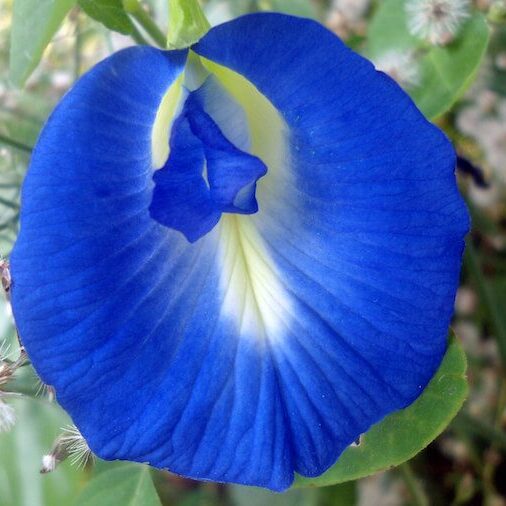The butterfly pea flower, also known as Clitoria ternatea, is native to Southeast Asia. It is commonly found in countries such as Thailand, Vietnam, and Malaysia, and it grows well in tropical and subtropical regions. In addition to its native range, Clitoria ternatea has also been introduced to other parts of the world, including the Caribbean, South America, and Africa, where it is grown for its attractive blue flowers and potential medicinal properties.
Known for its vibrant blue flowers and has been used for centuries in traditional medicine to treat a wide range of ailments. The vivid blue color of the flower is blue due to the presence of a pigment called delphinidin.
THE VIVID BLUE COLOR IS NOT JUST FOR LOOKS
Delphinidin is a type of flavonoid pigment that is responsible for the blue, purple, and red colors in many flowers. In the butterfly pea flower, delphinidin is present in the petals and gives the flowers their distinctive blue color.
Flavonoid pigments like delphinidin are produced by plants as part of their defense mechanism against UV radiation and other environmental stressors.
They are also thought to play a role in attracting pollinators, as their bright colors are visible to insects and birds. In addition to their role in the visual appearance of flowers, flavonoid pigments like delphinidin are also known for their antioxidant properties and have been shown to have potential health benefits when consumed by humans.

COGNITIVE ENHANCEMENT
"Evaluation of Anxiolytic and Cognitive Enhancing Effects of Clitoria ternatea Linn. in Rats" is a study that investigated the effects of Clitoria ternatea, also known as butterfly pea flower, on anxiety and cognitive function in rats.
The results of the study suggest that treatment with Clitoria ternatea may have anxiolytic effects, meaning it may reduce anxiety, and may also enhance cognitive function in rats. However, it is important to note that this study was conducted in rats and the results may not necessarily be applicable to humans.
Another study, "Clitoria ternatea and the Central Nervous System (CNS)" found that the compound positively impacted rats up to 160% in some object recognition tests.
FURTHER READING ON POTENTIAL COGNITIVE BENEFITS:

Anxiety reduction
One study, published in the Journal of Ethnopharmacology, found that treatment with Clitoria ternatea extract was associated with reduced anxiety-like behavior in mice. Another study, published in the Journal of Ayurveda and Integrative Medicine, found that treatment with Clitoria ternatea was associated with reduced anxiety in human participants.
It is thought that the anxiolytic effects of Clitoria ternatea may be due to its ability to affect the levels of certain neurotransmitters in the brain, such as serotonin and GABA, which are involved in regulating anxiety and mood. However, more research is needed to fully understand the mechanisms by which Clitoria ternatea may reduce anxiety.
FURTHER READING ON POTENTIAL ANXIETY REDUCTION BENEFITS
Anti-inflammatory effects
Inflammation is a normal immune response to injury or infection, and is characterized by swelling, redness, and pain. However, chronic inflammation can contribute to the development of several diseases, such as heart disease, cancer, and autoimmune disorders.
There are several mechanisms by which Clitoria ternatea extract may exert its anti-inflammatory effects. One study published in the Journal of Ethnopharmacology found that Clitoria ternatea extract inhibited the production of pro-inflammatory cytokines, which are molecules that play a role in the immune response and can contribute to inflammation. The extract was also found to inhibit the activity of certain enzymes, such as cyclooxygenase-2 (COX-2) and lipoxygenase (LOX), which are involved in the synthesis of inflammation-promoting compounds.
In addition to its effects on cytokines and enzymes, Clitoria ternatea extract may also have anti-inflammatory effects through its antioxidant activity. Free radicals are unstable molecules that can damage cells and contribute to inflammation. Antioxidants, such as those found in Clitoria ternatea extract, can help to neutralize free radicals and protect cells from damage.
Overall, the available evidence suggests that Clitoria ternatea extract may have potential as an anti-inflammatory agent, although more research is needed to fully understand the mechanisms by which it interacts with the body.
FURTHER READING ON POTENTIAL ANTI-INFLAMMATORY BENEFITS
HAVE QUESTIONS ABOUT NUTRITION, DIET AND SUPPLEMENTS?
SEDRA JUNDI MSC, RD, CNE
Click below to find out more about our resident nutritionist and dietitian in Dubai, Sedra Jundi, a highly qualified and experienced registered Dietitian in the United Kingdom, Canada and the Dubai Health Authority.

SO IN CONCLUSION
It is clear from the available scientific research that Clitoria ternatea, also known as butterfly pea flower, has the potential to offer several health benefits to humans.
Several studies have suggested that Clitoria ternatea extract may have anti-inflammatory effects in the body, through its ability to inhibit the production of pro-inflammatory cytokines and the activity of certain enzymes involved in inflammation. In addition, the herb's antioxidant activity may help to protect cells from damage caused by free radicals, which can contribute to inflammation.
There is also evidence to suggest that Clitoria ternatea may have anxiolytic effects, meaning it may reduce anxiety. This may be due to the herb's ability to affect the levels of certain neurotransmitters in the brain, such as serotonin and GABA, which are involved in regulating anxiety and mood.
Furthermore, some research has suggested that Clitoria ternatea may have cognitive-enhancing effects, improving cognitive function in both animals and humans. The mechanisms by which the herb may improve cognitive function are not fully understood, but it is thought to be related to its effects on neurotransmitter levels and its antioxidant activity.
While the available evidence suggests that Clitoria ternatea may have potential as an anti-inflammatory agent, anxiety reducer, and cognitive booster, it is important to note that more research is needed to fully understand the mechanisms by which it interacts with the body and the potential effects on human health. It is also important to consult with a healthcare provider before taking any herb or supplement, as they may interact with medications or have potential side effects.
It is also important to note that the information provided in this conclusion should not be taken as medical advice. If you are interested in incorporating Clitoria ternatea into your diet or are considering taking supplements, it is recommended that you consult with a qualified healthcare professional, such as a nutritionist or dietitian, in addition to a medical professional.
